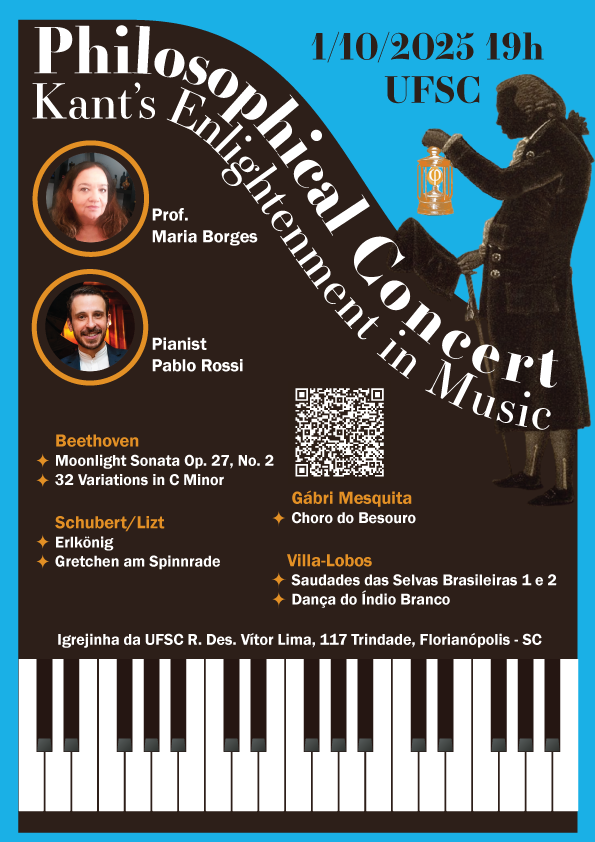Philosophical Concert: Kant’s Enlightenment in Music
Wed 01 Oct
|Igrejinha da UFSC


Local and Time
01 Oct 2025, 19:00 – 21:00 GMT-3
Igrejinha da UFSC, R. Des. Vítor Lima, 117 - Trindade, Florianópolis - SC, 88040-400, Brazil
About
Philosophical Concert: Kant’s Enlightenment in Music
Notice
As the venue has limited capacity, and in order to ensure the safety and comfort of all,
it will be necessary to obtain a free ticket through the Sympla platform.
Thank you for your understanding.
Program
Professor Maria de Lourdes Borges and the renowned pianist Pablo Rossi present “Philosophical Concert: Kant’s Enlightenment in Music”, an event that brings together philosophy and music to explore the Kantian Enlightenment through art. The presentation combines philosophical reflections on reason, freedom, and aesthetics with the performance of musical works that resonate with the spirit of the Enlightenment. This unique experience invites the audience to immerse themselves in the harmony between ideas and sounds.
In the first part, we will relate the Kantian Sapere Aude of the Enlightenment to Beethoven’s music, conceived as a rupture with the canon of Classicism. As examples, the Moonlight Sonata and the 32 Variations in C Minor will be performed.
In the second part, we present Schubert/Liszt’s composition Erlkönig, based on Goethe’s poem. The text of Erlkönig may be interpreted as an opposition between mysticism and reason, represented respectively by the Elf King and the father of a sick child. Also from Schubert/Liszt, we will hear Gretchen am Spinnrade, a reference to Goethe’s Faust.
Finally, we ask whether the Enlightenment and its hypertrophy of reason may have contributed to the disregard for nature, and whether concern for the survival of the Earth can be assimilated into an Enlightenment of the twenty-first century. In this last section, works by Gabri Mesquita and Heitor Villa-Lobos will be performed.
I.
Ludwig van Beethoven: Sonata Op. 27, No. 2 – “Moonlight”
32 Variations in C Minor, WoO 80
II.
Schubert/Liszt: Two Songs
Erlkönig
Gretchen am Spinnrade
III.
Gabri Mesquita: Choro do Besouro
Villa-Lobos: Saudades das Selvas Brasileiras Nos. 1 and 2
Dança do Índio Branco